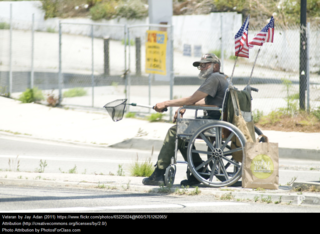Post-Traumatic Stress Disorder
Shutdown and Shutout: The Social Ecology of PTSD
Society can help heal the invisible wounds of PTSD.
Posted May 28, 2019
My patient, a Vietnam veteran, showed up to the clinic fuming with anger, his red face glistening with sweat. For 10 minutes, he vented about the government shutdown. Gesticulating and grinding his teeth as he spoke, his rant was peppered with soundbites he had likely picked up from the news. He continued with his torrent of abuse in a trance-like state. “Pathetic,” he spat. “These people have no business running the country, can’t do anything right… like Vietnam… we should have never been there in the first place.” Suddenly, his face froze, his lower lip quivered, and he started to sob. Brusquely wiping away tears with the palm of his hand, he asked, “I’m letting this get the better of me, aren’t I, doc?”
In my daily work as a Posttraumatic Stress Disorder (PTSD) specialist, the narratives of my Vietnam veteran patients often have a similar cadence: Drafted at the age of 19 or 20, he survived the tragedies of combat, but upon homecoming experienced hostility from his fellow Americans and felt ostracized from family and friends.
Some have spent decades reeling from the consequences of this unpopular war, as the betrayal of harsh homecomings has further amplified the psychological toll of horrific combat. Often symptoms of PTSD ensued, along with a devastating toll on an emotional life. PTSD keeps sufferers on the perpetual verge of withdrawal from the world and alienation from those who love them. Patchy employment, divorce, and estrangement from family are common themes.
Their anger and mistrust often extends to the United States government, “for getting us involved in a bullsh*t war in the first place,” and then to VA hospitals, which are viewed as an extension of the government. I often meet veterans who avoided the VA “like the plague” until they hit rock bottom. Tragically, care sought at this juncture often seems too little, too late.
For my patient, the government shutdown triggered his experiences of Vietnam and he was reliving those intense emotions again: the injustice about being drafted and the betrayal he felt when he came home. His anger was a byproduct of those memories.

Over the last two decades, researchers have uncovered the vital role that a sufferer’s community and social support network plays in the manifestation of PTSD.
Dr. Marylene Cloitre, a psychologist at the National Center for PTSD, headed a team which collated all research investigating the relationship between social support and PTSD in trauma survivors. Social support reflects a banner term that encompasses the size and complexity of a person’s social network, the nature of these relationships, and the qualities of such interactions. The researchers then integrated this data with findings from the fields of developmental psychology and social neuroscience and proposed a new conceptual framework called the social ecology of PTSD. This framework explained how the risk of PTSD and the likelihood of recovery is dependent upon social phenomena.
Cloitre’s seminal paper, which was published in The Annual Reviews of Psychology, solidified what many in the PTSD research community had suspected: A positive social network can not only help PTSD symptoms heal but that receiving social support after surviving a major trauma can prevent the onset of PTSD in the first place. Optimizing social support for trauma survivors thus represents a preventive pathway, an opportunity to intervene and set the survivor on a path to recovery.
While such conclusions might seem intuitive, the reality is that providing high-quality social support to trauma survivors has proven difficult for four major reasons.
- People who suffer trauma are frequently distraught, angry, and irritable. No matter how well-intentioned our supportive efforts, the situation is often complicated by the fact that a recent trauma survivor may not be an easy person to support. Failed attempts to engage with survivors can lead to awkwardness, confusion, and eventual distancing on the part of supporters.
- Perception is reality for a trauma survivor. A survivor’s perception is their reality. Study after study has shown that the survivor’s subjective experience of the helpfulness of others is much more relevant than the actual nature of their social network. One such study examined data from almost one thousand World War II and Korean War veterans. Among their many findings was this: “A supportive childhood family environment can have lifelong protective effects, whereas a conflict-ridden family environment can set up lifelong patterns of pessimistic appraisals.” Attempts to support survivors of trauma, no matter how well-intentioned, may have a negligible impact if the survivor is unable to recognize the support for what it is.
- Cumulative trauma can strain social engagement. Trauma survivors bring the full weight of their past experiences to their current circumstance. A rape survivor who has been resilient in the face of previous traumas may now, after surviving sexual violence, be unable to tap into the benefits of her social network. The rape serves as the final straw that broke the proverbial camel’s back.
- Victim-blaming and societal failure. It’s important not to forget the arbitrariness of how society determines who should benefit from its support. A quick skim through the history books shows that the most disadvantaged or vulnerable groups of people—women, children, minorities, and marginalized groups—have often been deemed unworthy of social support after traumatizing experiences, or worse, society engages in victim-blaming exercises.
Despite all these challenges, the social scaffolding that trauma survivors need has grown in the past two decades. Resources for dealing with trauma have become more widely available in our communities, schools, hospitals, and workplaces. The education provided to family members, employers, and healthcare providers about the survivor experience has improved. Social networks are being re-engineered to be more accessible for survivors via integrated care models, the use of peer support programs and technology. Calls for trauma-informed healthcare and schooling are growing stronger, too.
The science of suffering has shown us the power of social bonds in helping trauma survivors heal. We must all feel empowered to continue to do more for survivors—we have too much to lose as a society if we don’t.
Identifying details of the patient have been omitted.
LinkedIn Image Credit: Chanintorn.v/Shutterstock


